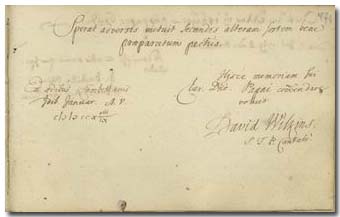
Sperat adversis metuit secundis alteram sortem bene praeparatum
pectus. *
Hisce memoriam sui Car[issimo] D[omi]no Papai commendare voluit
David Wilkins. S[acrae] T[heologiae] P[rofessor] Cantabr[igiensis]
Ex aedibus Lambethanis

|
* Horace, Carmina 2.10.13-14
(in the original: “sperat infestis…”). We quote it in the
English translation by John Conington.
|
|
|
|
In sadness hope, in gladness fear / 'Gainst coming change will
fortify / Your breast. *With this I
wish to recommend myself into the good memory of the dear Mr.
Pápai
David Wilkins, professor of
theology in Cambridge
In Lambeth Palace, on the Idus of
January of 1718, by the old calendar
|
p. 471. [London], January 24, 1719
Wilkins, David
(1685-1745), German Anglican
pastor, orientalist
David Wilkins (by his original name Wilke /
Wilkius) was born in 1685 in a Prussian family. For many years he
wandered throughout Europe: in Berlin he studied Coptic
manuscripts, in Rome in 1710 the manuscripts of the Vatican and of
the Barberini Library, then after Vienna, Paris, Amsterdam and
Oxford he went to Cambridge, where in 1717 he graduated doctor of
theology (D.D.). Here he became Lord Almoner's professor of
Arabic, and was consacrated Anglican pastor. He was patronized by
the Archbishop of Canterbury William Wake. From 1715 he was
librarian of the Archiepiscopal Lambeth Palace Library – this was
the first public library of England –, then from 1719 chaplain of
the Archbishop. In 1721 he received the twelfth canon's prebend in
the Cathedral, and in 1724 he became archdeacon in Suffolk. In
1720 he was elected fellow of the Society of Antiquaries (F.S.A.).
He died on September 6, 1745 in Hadley. In the Lambeth Library he
completed the catalogue of Gibson, and prepared the catalogue of
the manuscripts. He made an important contribution to the study of
oriental languages. He mastered Hebrew, Chaldean, Coptic, Armenian
and even Anglo-Saxon, although his versatility was sometimes to
the detriment of accuracy. He edited various Latin authors, the
Coptic New Testament, and parts of the Coptic Old Testament. His
best known book is the great historical work published in 1737.
Some of his works: Targum
sael Dibre haj-Jamim risonim we-aharonim = Paraphrasis Chaldaica
in librum … chronicorum … Amsterdam, 1715. – Novum
Testamentum Aegyptium, vulgo Copticum ex mss Bodlejanis descripsit
… Oxford, 1716. – Leges Anglo-Saxonicae ecclesiasticae et
civiles … London, 1721. – Concilia Magnae Britanniae et
Hiberniae: a synodo Verolamiensi A.D. CCCCXLVI. ad Londinensem
A.D. MDCCXVII (446-1717). London, 1737.
David Wilkins, Librarian of the Archiepiscopal Library wrote in
the album of Ferenc Pápai Páriz on the same day – that is on
January 13, 1718 – when the Archbishop of Canterbury William Wake
(p. 469). In most countries of Europe in
that day the date was January 24, 1719. Wilkins wrote his memento
probably in London, in the Archiepiscopal Lambeth Palace.
•
DNB • Michaud |

